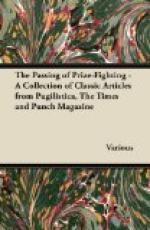To keep up his character, a new man ought perpetually to carry a stethoscope—a curious instrument, something like a sixpenny toy trumpet with its top knocked off, and used for the purpose of hearing what people are thinking about, or something of the kind. In the endeavour to acquire a perfect knowledge of its use he is indefatigable. There is scarcely a patient but he knows the exact state of their thoracic viscera, and he talks of enlarged semilunar valves, and thickened ventricles with an air of alarming confidence. And yet we rather doubt his skill upon this point; we never perceived anything more than a sound and a jog, something similar to what you hear in the cabin of a fourpenny steam-boat, and especially mistrusted the “metallic tinkling,” and the noise resembling a blacksmith’s bellows blowing into an empty quart-pot, which is called the bruit de soufflet. Take our word, when medicine arrives at such a pitch that the secrets of the human heart can be probed, it need not go any further, and will have the power of doing mischief enough.
The new man does not enter much into society. He sometimes asks a few other juniors to his lodgings, and provides tea and shrimps, with occasional cold saveloys for their refection, and it is possible he may add some home-made wine to the banquet. Their conversation is exceedingly professional; and should they get slightly jocose, they retail anatomical paradoxes, technical puns, and legendary “catch questions,” which from time immemorial have been the delight of all new men in general, and country ones in particular.
But diligent and industrious as the new man may be, he is mortal after all, and being mortal, is not proof against temptation—at least, after five or six weeks of his pupilage have passed. The good St. Anthony resisted all the endeavours of the Evil One to lure him from the proper path, until the gentleman of the discoloured cutis vera assumed the shape of a woman. The new man firmly withstands all inducements to irregularity until his first temptation appears in the form of the Cyder-cellars—the convivial Rubicon which it is absolutely necessary for him to pass before he can enrol himself as a member of the quiet, hard-working, modest fraternity of the Medical Student of our London Hospitals.
Facilis descensus Averni.—The steps that lead from Maiden-lane to the Cyder-cellars are easy of descent, although the return is sometimes attended with slight difficulty. Not that we wish to compare our favourite souterrain in question to the “Avernus” of the Latin poet; oh, no! If AEneas had met with roast potatoes and stout during his celebrated voyage across the Styx to the infernal regions, and listened to songs and glees in place of the multitude of condemned souls, “horrendum stridens,” we wager that he would have been in no very great hurry to return. But we have arrived at an important point in our physiology—the




